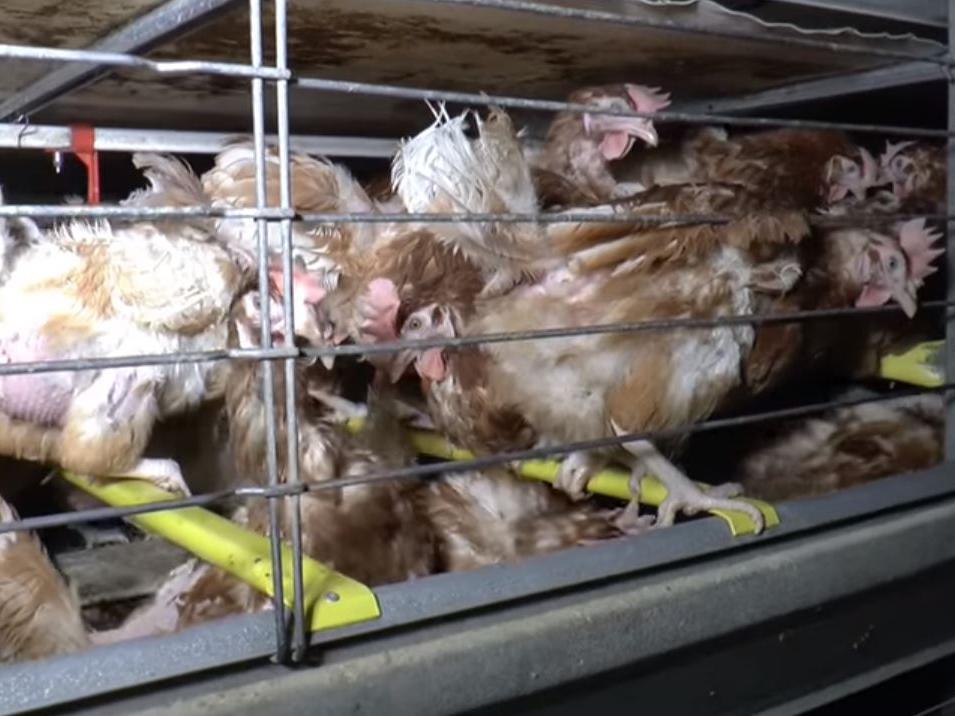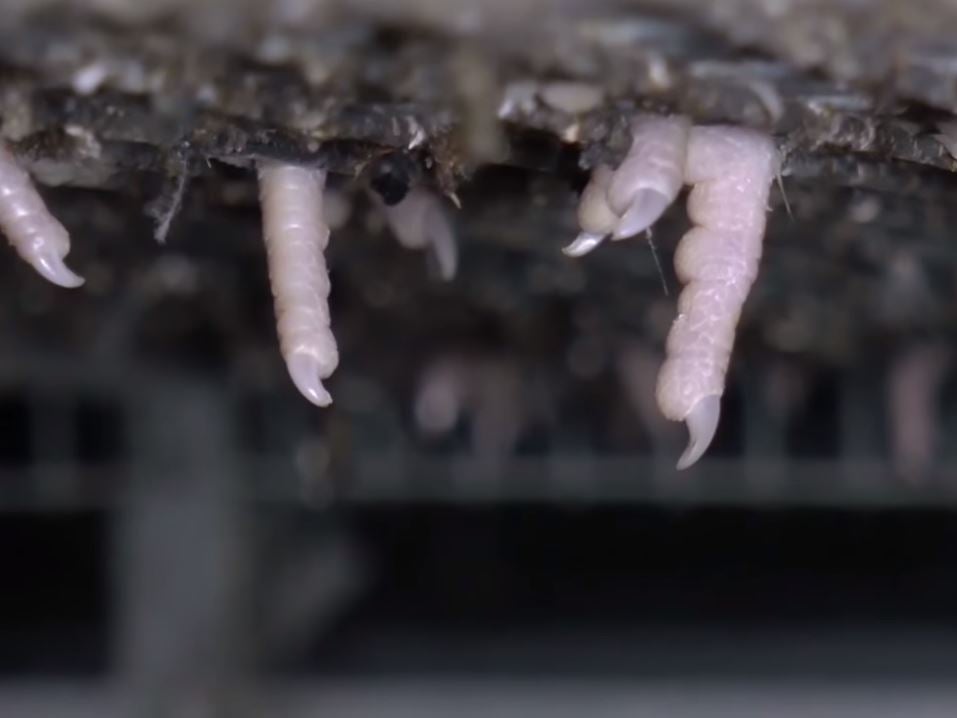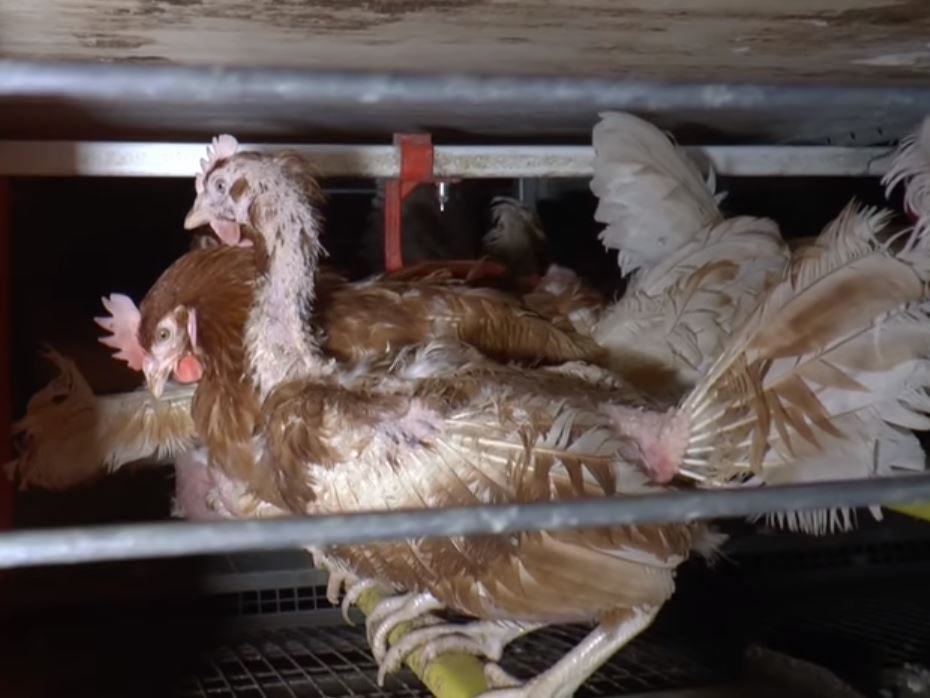Exposed: The shocking and filthy conditions endured by supermarket hens in 'enriched cages'
Exclusive: Videos handed to The Independent show distressed birds in squalid cages the poultry industry insists improve welfare standards
Your support helps us to tell the story
From reproductive rights to climate change to Big Tech, The Independent is on the ground when the story is developing. Whether it's investigating the financials of Elon Musk's pro-Trump PAC or producing our latest documentary, 'The A Word', which shines a light on the American women fighting for reproductive rights, we know how important it is to parse out the facts from the messaging.
At such a critical moment in US history, we need reporters on the ground. Your donation allows us to keep sending journalists to speak to both sides of the story.
The Independent is trusted by Americans across the entire political spectrum. And unlike many other quality news outlets, we choose not to lock Americans out of our reporting and analysis with paywalls. We believe quality journalism should be available to everyone, paid for by those who can afford it.
Your support makes all the difference.Undercover footage has revealed the cramped, dirty conditions endured by hens living in "enriched cages" on farms that supply eggs to major UK supermarkets.
Videos provided to The Independent by animal welfare group Viva! show diseased and dead birds, and also baby hens packed into intensive rearing cages with gaps in the wire floor too large for their small claws.
The footage, which campaigners say was legally obtained observing biosecurity rules, was taken at two farms: one in Wolverhampton and the other near the Welsh border in Shropshire. Viva! say the films raise new questions about the quality of "enriched cages" which were introduced as an improvement to battery conditions but which the group says are a "joke".
As soon as managers from supermarket chain Lidl saw the video, the company said it was "very disappointed" and is "currently investigating these findings with our supplier as a matter of urgency".
At Seisdon Poultry Unit in Wolverhampton, owned by Ridgeway Foods, ragged hens – some with few remaining feathers – are seen perching close together on metal bars in ‘enriched’ cages, which replaced battery cages after they were banned throughout the EU in 2012.
Dead hens lie on the soiled floor surrounded by eggs in what campaigners called the “terrible reality” behind caged egg production.
And at Oaklands Farm in Shrewsbury, young birds known as pullets are seen with their beaks trimmed, a legal practice that campaigners say is cruel, as maggots form next to a bin containing the discarded carcasses of grown hens who have died.
The Independent has learnt that Ridgeway Foods is a supplier for Noble Foods, which sells eggs from caged hens under the 'Big & Fresh' brand to Tesco, Asda, Morrisons and One Stop stores.

“Viva! has filmed in many factory farms, but conditions here revealed some of the worst we’ve seen,” said the group's campaigner Claire Palmer about the Ridgeway Foods footage.
“Our findings are a sad illustration of a cage-age for hens that is still very much present, despite the fact battery cages were abolished four years ago. This is the terrible reality for around 18 million hens in Britain today.”
Battery cages were banned by the European Union after high-profile campaigns led by Jamie Oliver and others condemned the system in which each hen has the area of a sheet of A4 paper.
But more than half of the 10 billion eggs produced in the UK last year – 51 per cent – were laid by hens kept in these kinds of ‘enriched’ cages, which can hold up to 90 birds. They are meant to give hens more time to nest, roost and stretch.
A small percentage of eggs were from hens reared in barns or organic farms, and 44 per cent were from free-range farms.
A spokesperson for Ridgeway Foods said its farms, including Seisdon Poultry Unit, were compliant with government and European regulations.
They said the farm had been affected by a “minor health challenge” when the undercover video was filmed on 3 September.
“Our farms are fully compliant with UK Government and European regulations on the welfare of birds and we are closely audited in everything we do. In addition, no issues were found following a recent routine visit from a Government agency,” they told The Independent.
“Our sites and our birds are checked regularly throughout the day. This flock had been affected by a minor health challenge which, under veterinary guidance, was quickly treated but as a consequence some of the birds had feather loss.
“The farm has been fully checked by an independent vet this week who found the flocks to be in good health.”
Noble Foods, a leading supplier of fresh eggs to the UK’s biggest supermarket chains, sells both free-range eggs under the 'Happy Egg Co' brand and caged eggs under the 'Big & Fresh' brand, which carries the red British Lion Quality stamp.
“Noble Foods demands the highest standards of animal welfare from all its suppliers and is satisfied Ridgeway Foods meets these criteria,” a Noble Foods spokesperson told The Independent.
“Ridgeway Foods Seisdon farm was independently audited on 17 October following an unscheduled ad hoc visit by Defra as well as by specialist vets, Wyatt Poultry Veterinary Services on 19 October and both organisations gave the site a clean bill of health.”

Tesco, Asda, Morrisons and One Stop have pledged to phase out the sourcing of eggs from caged hens and stop selling them completely by 2025.
Sainsbury’s, Waitrose and The Co-Op among other supermarkets already only sell eggs laid by free-range or barn-reared hens.
Viva! said their footage shows this transition is a matter of urgency and shops like Tesco and Asda should take action sooner, but Tesco told The Independent it would be “logistically difficult” to move its target date forward.
An Asda spokesperson declined to comment as 'Big & Fresh' eggs are a branded product. Morrisons and One Stop have not yet replied to The Independent’s request for comment.

The Oaklands Farm footage was taken on 26 August during a heatwave, which could account for an increased number of maggots around the bin filmed by the campaigners.
Farm owner Elwyn Griffiths questioned the legality of the methods used to gather the footage and told The Independent dead birds were removed from the farm every day.
He said Oaklands Farm takes the health and welfare of its hens “very seriously” and contended that the filming may have caused “considerable stress to these young hens”.
“We fully comply with government legislation both UK and European,” he said. “The pullets are housed in a fully compliant system.”
“If someone broke into your house in the middle of the night it would frighten you to be woken by bright lights,” he added.
“As our business operates to the highest standards and has nothing to hide I would extend an invitation to Viva! to visit us like all others do in the daytime”.
Oaklands Farm Eggs, which owns the farm in Shrewsbury among others, produces Lion Quality Approved free-range and “fresh” caged eggs.
The company supplied eggs to Lidl in Wales 2014, according to the Shropshire Star.
Mr Griffiths said Viva’s footage was taken at a rearing farm and as such “has no relevance to historical egg sales and has no direct connection to egg production or sales.”
When shown the footage, a Lidl spokesperson said the supermarket was “very disappointed to see certain elements of this video and are currently investigating these findings with our supplier as a matter of urgency.”
Lidl is “working hard to phase out the sale of eggs from caged hens in our UK stores by 2025 at the latest,” they added.
Viva said it had reported the conditions on both farms to the local offices of the government Animal and Plant Health Agency (APHA) but had not received a response.
An APHA spokesperson said the agency was “unable to comment on individual cases” but that it taes “potential breaches of animal welfare legislation very seriously and investigates all allegations.
“Where welfare problems are found, advice or warnings are usually sufficient to bring about satisfactory improvements.
"Where necessary and where the evidence is available, the local authority, as the appropriate enforcement agency, may initiate prosecution action for welfare offences."
A Viva! spokesman said: "We think the photos speak for themselves. The question has to be asked exactly how bad do things have to be before any action is taken? Every time we see the inside of one of these cage facilities we see similar scenes of despair. Even though the battery may be gone, it is just been replaced by another slightly bigger cage. These so-called enriched cages are a joke, but are still the sad reality for hens used to supply most British supermarket eggs."

Join our commenting forum
Join thought-provoking conversations, follow other Independent readers and see their replies
Comments